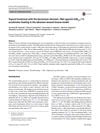 6 citations,
November 2017 in “Skin appendage disorders”
6 citations,
November 2017 in “Skin appendage disorders” Topical botanical lotion increases hair density and improves quality of life in women with hair loss.
 4 citations,
January 2018 in “Forensic Science International”
4 citations,
January 2018 in “Forensic Science International” Researchers created a reliable method to detect hair-growth substances in products.
 3 citations,
October 2018 in “Archives of Dermatological Research”
3 citations,
October 2018 in “Archives of Dermatological Research” Applying InlB321/15 to wounds sped up healing in mice.
 2 citations,
September 2022 in “Bioscientia medicina”
2 citations,
September 2022 in “Bioscientia medicina” Topical vitamin D is effective in treating vitiligo with few side effects.
 2 citations,
March 2020 in “International Journal of Molecular Sciences”
2 citations,
March 2020 in “International Journal of Molecular Sciences” Topical treatments can deliver active molecules to skin stem cells, potentially helping treat skin and hair disorders, including skin cancers and hair loss.
 1 citations,
April 2017 in “Journal of Investigative Dermatology”
1 citations,
April 2017 in “Journal of Investigative Dermatology” SM04554 may increase hair growth as a topical treatment for androgenetic alopecia.
 July 2024 in “Dermatology and Therapy”
July 2024 in “Dermatology and Therapy” Darker hair colors may increase the risk of alopecia areata, while lighter hair colors may decrease it.
 April 2017 in “Journal of Investigative Dermatology”
April 2017 in “Journal of Investigative Dermatology” SB414 may be an effective treatment for atopic dermatitis by reducing swelling and bacterial infection.
 138 citations,
August 1985 in “Journal of The American Academy of Dermatology”
138 citations,
August 1985 in “Journal of The American Academy of Dermatology” Minoxidil promotes hair growth in male pattern baldness.
 61 citations,
April 2014 in “Radiation Research”
61 citations,
April 2014 in “Radiation Research” RTA 408 cream protects mice from radiation skin damage.
 56 citations,
November 1993 in “Journal of The American Academy of Dermatology”
56 citations,
November 1993 in “Journal of The American Academy of Dermatology” Capsaicin cream quickly relieved itching in two patients with brachioradial pruritus.
 51 citations,
May 2010 in “Journal of Drug Targeting”
51 citations,
May 2010 in “Journal of Drug Targeting” Transcutol-containing vesicles improve minoxidil's skin penetration and hair growth promotion.
 47 citations,
July 2005 in “British Journal of Dermatology”
47 citations,
July 2005 in “British Journal of Dermatology” Topical vitamin D3 does not prevent hair loss from chemotherapy.
 45 citations,
August 2011 in “Journal of Microencapsulation”
45 citations,
August 2011 in “Journal of Microencapsulation” Chitosan microparticles improve minoxidil sulphate delivery, potentially reducing daily applications.
 45 citations,
January 2010 in “International journal of trichology”
45 citations,
January 2010 in “International journal of trichology” Topical immunotherapy, especially with DPCP, is effective for treating severe alopecia areata.
 38 citations,
June 2005 in “Contact Dermatitis”
38 citations,
June 2005 in “Contact Dermatitis” Patient had scalp allergy from minoxidil; test helped identify cause and suggest alternative treatments.
 32 citations,
December 2000 in “Phytomedicine”
32 citations,
December 2000 in “Phytomedicine” Apple-derived procyanidin B-2 can safely promote hair growth in men.
 28 citations,
December 2005 in “Journal of cosmetic dermatology”
28 citations,
December 2005 in “Journal of cosmetic dermatology” Apple procyanidin applied to the scalp may help grow hair without side effects.
 22 citations,
March 2020 in “Cosmetics”
22 citations,
March 2020 in “Cosmetics” Nanotechnology improves minoxidil treatment for hair loss.
 21 citations,
January 2017 in “Skin Pharmacology and Physiology”
21 citations,
January 2017 in “Skin Pharmacology and Physiology” Caffeine-based liquid 0.2% is as effective as minoxidil 5% for treating male hair loss.
 20 citations,
January 2012 in “International journal of trichology”
20 citations,
January 2012 in “International journal of trichology” Steroids are the best treatment for Alopecia Areata with few side effects.
 18 citations,
October 2018 in “Nutrients”
18 citations,
October 2018 in “Nutrients” Annurca apple extract promotes hair growth by changing hair follicle metabolism to boost keratin production.
 15 citations,
November 2019 in “Cutaneous and Ocular Toxicology”
15 citations,
November 2019 in “Cutaneous and Ocular Toxicology” Minoxidil tretinoin liposomal based hydrogel shows promise for effective treatment of hair loss by delivering both drugs at the same time.
 15 citations,
May 2017 in “Journal of Dermatological Treatment”
15 citations,
May 2017 in “Journal of Dermatological Treatment” Latanoprost works better for hair growth, and combining it with betamethasone valerate is most effective.
 7 citations,
July 2020 in “Pigment cell & melanoma research”
7 citations,
July 2020 in “Pigment cell & melanoma research” RT1640 treatment reverses gray hair and promotes hair growth in mice.
 7 citations,
November 1987 in “Pharmacotherapy: The Journal of Human Pharmacology and Drug Therapy”
7 citations,
November 1987 in “Pharmacotherapy: The Journal of Human Pharmacology and Drug Therapy” Minoxidil can help thicken hair in some people with male pattern baldness, especially if used early and continuously.
 4 citations,
August 2020 in “Facial plastic surgery & aesthetic medicine”
4 citations,
August 2020 in “Facial plastic surgery & aesthetic medicine” Combining growth factors with minoxidil improves hair growth more than minoxidil alone.
 May 2024 in “Indian journal of pharmacy and pharmacology”
May 2024 in “Indian journal of pharmacy and pharmacology” Luliconazole is more effective than ketoconazole at repairing damaged hair cuticles.
 April 2017 in “Journal of Investigative Dermatology”
April 2017 in “Journal of Investigative Dermatology” SM04755 may be an effective topical treatment for psoriasis.
 April 2017 in “Journal of Investigative Dermatology”
April 2017 in “Journal of Investigative Dermatology” SIG-1451 could be a promising new treatment for atopic dermatitis.






























